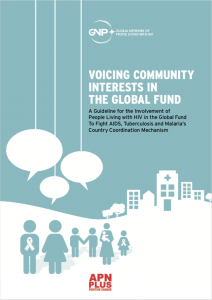SHIFT reports on “Voicing Community Interest in the Global Fund”: a new resource for communities living with HIV and Key Populations, released by GNP+ and APN+
SHIFT reports on a new resource for communities living with HIV and Key Populations–Voicing Community Interest in the Global Fund: A Guideline for the Involvement of People Living with HIV in the Global Fund To Fight AIDS, Tuberculosis and Malaria’s Country Coordination Mechanism. This resource has been released by The Global Network of People Living with HIV (GNP+) in partnership withThe Asia Pacific Network of People Living with HIV/AIDS (APN+).
This new resource aims to strengthen active community engagement within Country Coordinating Mechanisms (CCMs) and stresses the ongoing importance of PLHIV led communication, coordination, and consultation.
“People Living with HIV hold strategic positions within CCMs and all too often these positions are ineffectively utilized,’’ says Omar Syarif, GNP+’s Program Manager, and author of this tool. “As such, it is critically important that communities affected by HIV are actively involved at all levels of Global Fund decision-making, and this involvement needs to be facilitated in a transparent, accountable and standardized manner, sensitive to local context.
The Global Network of People Living with HIV works to improve the quality of life of all people living with HIV. This means we advocate for, and support fair and equal access to treatment, care and support services for people living with HIV, in all of our diversity, around the world.
The Asia Pacific Network of People Living with HIV/AIDS is the network of PLHIV living in the Asia Pacific region. It was established in response to the need for a collective voice for PLWHA in the region, to better link regional PLHIV with GNP+ and positive networks throughout the world, and to support regional responses to widespread stigma and discrimination and better access to treatment and care.


